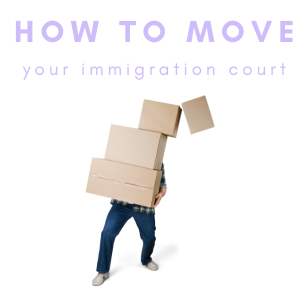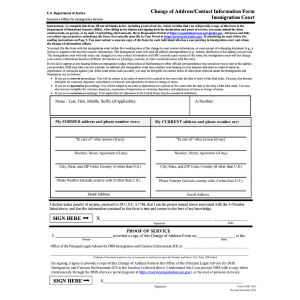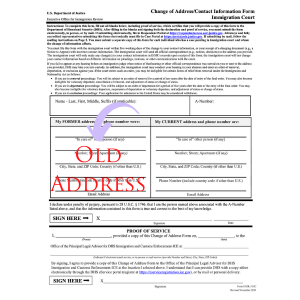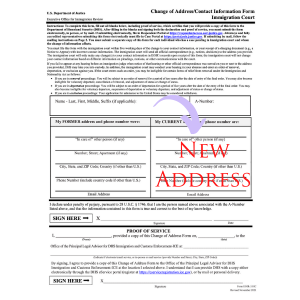Can I move my immigration court?

You may be wondering, “Can I move my immigration court?” Perhaps your deportation case is in one city and state, but you want to transfer it to another. In legal terms, this process is called a “change of venue.”
There are many good reasons to change your immigration court. Perhaps you moved to a new city. Or maybe you want a better judge or court.
In this article, we’ll explain why you might want to move your immigration case. Next, we’ll explain how to do it. Finally, we’ll discuss whether you will need a lawyer for the process.
Reasons to Move Your Immigration Court
Should you move your immigration court? There are many valid reasons to move your immigration court.
1. You live too far from the immigration court
This is by far most common reason for transferring your case to a different immigration court. Initially, immigration officials will file your case in the nearest immigration court. But what happens when you move to a different address? Unless you notify immigration officials, nobody will know.
Traveling to a faraway immigration will pose many problems. First, you will have to spent lots of time and money to travel to the immigration court. Second, you may have problems getting an immigration lawyer to help with your case. For example, if you live in Chicago, but your case is in San Antonio, you probably won’t be able to find a Chicago immigration attorney to assist with your case. You’re better off moving your immigration court to Chicago, and finding a lawyer in your area.
2. You left immigration jail
If you were in immigration detention, officials will file your case at the immigration court where you are held or at nearby court. So, for example, if you are detained at the El Paso Service Processing Center, your immigration court will be held there.
But what happens when you leave immigration jail? It is very common for ICE to release people from immigration jail on a bond.
Upon release, you have to move your immigration court to a new location.
3. You want a better immigration judge
Simply because you want a better immigration judge does not mean that the court will allow you to move your case to a different court. But seeking a friendlier immigration judge may be a good reason to try to change your immigration court.
It is no secret that some immigration judges are very unfriendly towards immigrants, while some are much friendlier. Thus, which judge you get will make a big difference in whether you win or lose your case.
4. You want to speed up or slow down your immigration court case
Some courts are much slower than others. For example, the San Francisco Immigration Court has a backlog of nearly 80,000 cases. In San Francisco, case takes on average over 3 years to resolve. By contrast, the El Paso Immigration Court has a much smaller backlog of 16,000 cases. And, on average it finishes cases within 1.5 years. The El Paso Court resolves cases in half the time. In sum, immigration courts move at very different speeds.
So, depending on whether you want to speed up or slow down your case, you may look into moving your immigration court.
How to Move Your Immigration Court
To move your immigration court, you need to make a request to the immigration judge. This request is called a “motion to change venue.”
Two ways to ask an immigration judge to move your court
The request can be made in two ways:
- Filing a written request to the immigration court, or
- Asking the immigration judge during a master hearing
If you make the request in writing, you will need to title your request a “Motion for Change of Venue.” In it, you must explain your reasons for wanting a change in immigration court. You will also need to respond to the allegations made against you in the charging document. And you will need to explain what type of relief you are seeking.
Making the request in-person, during a hearing, is easier and less formal.
Regardless of how you ask to change your immigration court, you will still have to provide certain key information.
The immigration judge will expect you to bring some important documents and information.
When you ask the judge to move your immigration court, he will want certain key information.
1. Bring a completed change of address form.
The change of address form is here. Immigration officials called it a Form EOIR-33, or Form E-33. Traditionally, officials print it out on light blue paper.

Filling out the form is easy, and you don’t need a lawyer for this part.
On the left half of the form, write your old address:

Next, on the right side of the form, write your new address.

Then, on the bottom of the form, write the address where you will send a copy to ICE. Finally, write name and alien number and sign on the top and the bottom. Mail or hand-deliver a copy to the court. And don’t forget to send a copy to ICE.
Now we turn to the second thing you need to give the judge in order to move your court.
2. Provide evidence that you have moved
You’re asking the judge to move your court to a new location because you moved to a new address. Naturally, the judge will probably want to see proof that you moved.
Proving a change of address is not hard. There are many papers you can present to the judge:
- Utility bill
- Lease agreement
- Bank statement
- Driver’s license
- Property tax receipt
- Car insurance
- Paystubs
3. Respond to the allegations in the charging document
When you first entered deportation proceedings, ICE officials gave you a charging document called a Notice to Appear.
Before the judge will move your court to a new location, he will want you to tell him whether you admit or deny the allegations on the Notice to Appear. He will also ask you whether you want to seek relief from deportation.
Do I Need a Lawyer to Move My Immigration Court?
You don’t need a lawyer to move your immigration court. Lots of people are able to convince the judge to transfer the case without the help of an immigration lawyer.
However, you should probably get the help of an immigration lawyer in one situation: when you have not yet responded to the allegations on the Notice to Appear. As explained above, you must respond to these allegations before a judge will change your immigration court. And how you respond to these allegations is crucial for your case.
It is easy to make a mistake in responding to the Notice to Appear. After all, the document contains legal charges. And if you’re not an expert on the law, you will not fully understand the charges.
In conclusion, if you’re at a preliminary stage of your case, where you have not responded to the allegations in the charging document, get an immigration lawyer before asking to move your immigration court.



